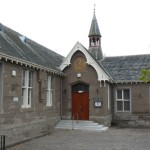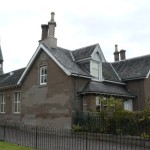Scone Public School
In this article Scone Remembers have been researching the impact of WW1 on our community in Scone, especially how if affected the children and the Public School known as Robert Douglas Memorial Institute (RDMI).
By 1914 Britain had a basic education system which varied depending on which educational legislation applied. Since 1901 in Scotland, the school leaving age had been 14years but in England for most school children it did not take them beyond the elementary age of 12. During World War 1, it is reported that Mr H.A.L. Fisher an Oxford scholar and Minister of Education was one of the people who researched the issues of education, highlighting the lack of finance and absenteeism. During this time he developed a far sighted plan for change and improvement which later was embodied in the wide ranging Education act of 1918.
Here in the Parish of Scone 1911 censor shows a total of 2341 residents. Scone Public School Minutes show, a varied enrollment of between 277 and 223 Children. Scone War Memorial has 72 names listed and of those 18 servicemen who never returned, attended Scone Public School.
An article `Children at War` from the newspaper the Constitutional tells us, at the outbreak of war a number of schools were requisitioned, or at least, in part to accommodate volunteers and reservists. Scone School escaped although there is mentioned of a letter received in August 1914, of the possible requisition, but it was deemed to exempt due to `exceptional circumstances, our research could not identify the reason. The School did not escape total attention with the volunteer platoon applying for permission to use the gymnasium as a shooting range, which was approved (assuming no children were taking exercise in the gym) and also a club room for the soldiers from the Gordon Highlanders camp.
The children were encouraged to help the war effort and in early 1915 formed a school garden to grow vegetables, which were mostly used in the school soup kitchen, with any surplus going to the hospital and Perth Barracks. Children also made garments for the comfort of the troops and under the direction of the Parish Committee in 1916, raised £40 through concerts (in today’s value £4000). Children at that time were also encouraged to gather shells and nuts for the war effort. These were then turned into activated carbon, a vital ingredient for gas mask filters. In December 1918, it was recorded that the School children had collected waste paper receiving three pounds and seven shillings, which went to the hostel for limbless soldiers in Edinburgh.
During this time there were many pupils absentees both permitted and unpermitted. Due to the shortage of labour in the area, particularly in farming children were often used as the work force. Scone public school minutes recorded teacher’s visits to families of absent children, monitoring their attendances. As the war progressed, more men were called to the front and school holidays were then adjusted to take into account the harvest, potato picking and so on.
The janitor in 1914 was Alex Wishart (known as Sandy) a reservist, who was called up in August 1914; he was badly wounded at Mons and taken prisoner. In June 1916, the school board received a letter from him in Switzerland, to where he had been transferred. We do not know how he ended up in Switzerland. In 1915 it transpires that James Gerard, the American Ambassador to Berlin, negotiated with the Germans and British Government to reach an agreement, to repatriate limbless and hopelessly invalided prisoners of war deemed no longer fit for combat, to a safe haven.
In May 1916, 350 or so wounded and disabled men were transferred from German Prison Camps to neutral Switzerland; it may well be that Pte Alex Wishart. 9577, of the Scottish Borderers, was one of those transferred. The British Minister present at the exchange, Mr Grant Duff said, “It is difficult to write calmly of it…. For the simple reason that I have never before in my life seen such a welcome accorded to anyone…” In the same way a reporter from the Times commented `Our men were astounded at the welcome; many were crying like children, a few fainted with emotion`. As one private said to the British Minister, “God bless you sir, it’s like dropping right into `even from ell…’
In response to his letter, the School Board members subscripted £1 which was sent to Pte Alex Wishart. He was eventually repatriated and discharged from the Army in February 1918. When War was declared over, the headmaster at that time, a Mr. Sutherland arranged Peace Celebrations of a short Service at the Parish Church, then a march to the cricket Park, with games for the children. An afternoon tea was provided for the demobilized soldiers and the community had a bon-fire in the evening. It is also noted in the minutes of Scone Public School that the school Manager, Mr Hutchison was to act on the committee for the District, under the new educational authority.
After the war, Alex Wishart returned to Perthshire and took up the position at Scone Public School as janitor and actively worked voluntarily for the good of the community. There is further information about him if you look at Google’s web site.
Dawn Olsen. September 2014.
Scone Remembers wishes to thank Graham Watson for his help with the research. If anyone would like to join us and help research the servicemen on our War memorial, we would like to hear from them.
Reference
The Constitutional, Perthshire Advertiser, School Board Report 1914-18


